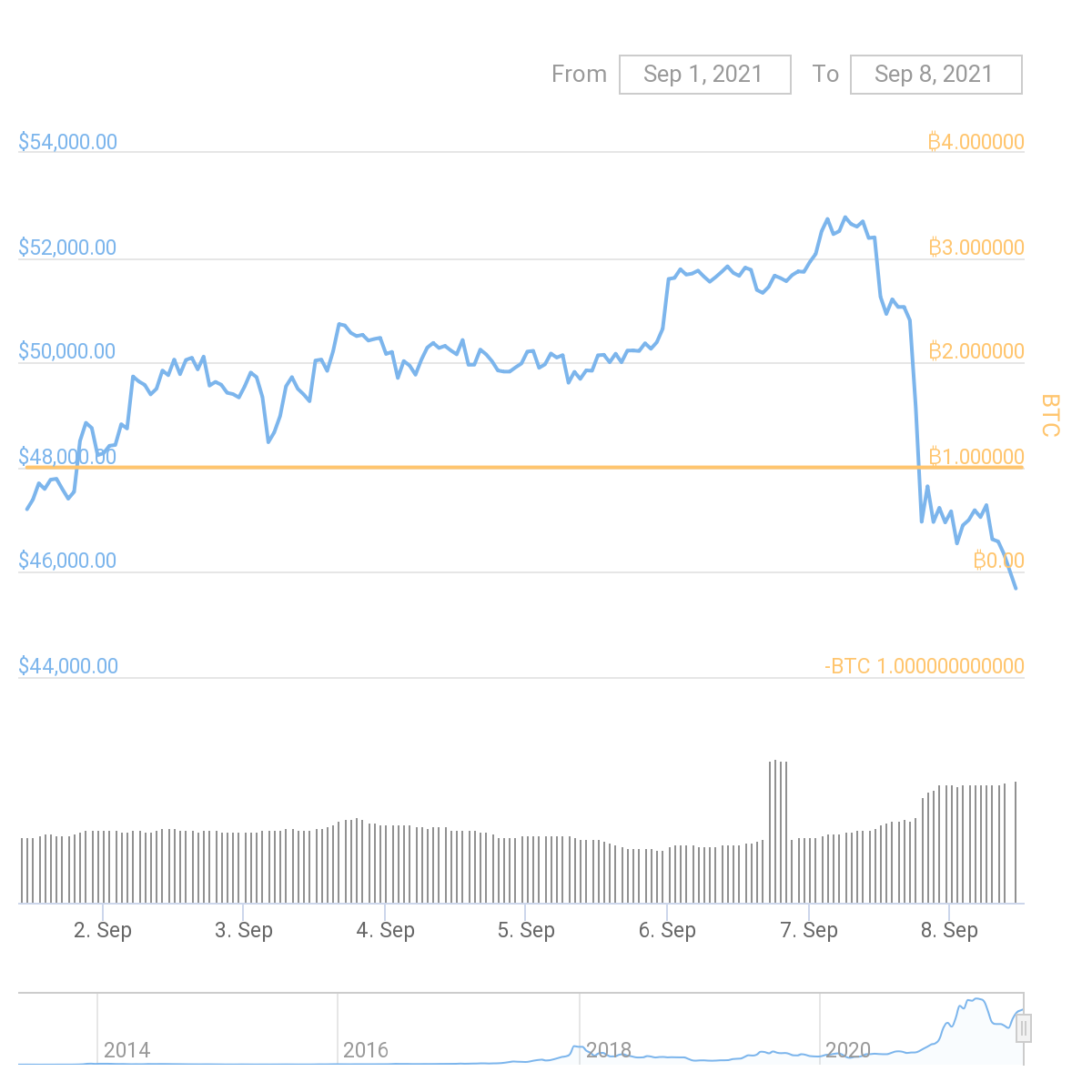Flash Crash Topples Bitcoin (BTC) Price

After an encouraging breakout, where Bitcoin (BTC) stood at $52,700 and other assets marked all-time highs, the market went through a flash crash, led by BTC traders.
Within minutes, BTC erased $10,000 from its value, touching $42,000 before bouncing. The flash crash affected all exchanges with the exception of the Korean market, where a $10,000 premium was preserved. The rapid selling also caused another Coinbase outage, with potential buyers unable to access trading during the crash.
The flash crash was considered unpredictable and repeats similar scenarios from March 2020 and May 2021. Once again, the most at-risk positions with leverage were liquidated, wiping out $4B.
The market crash still erased a smaller portion of leveraged positions in comparison to May’s correction, where more than $9B were wiped out.
BTC Activity Accelerated
After weeks of relatively subdued trading volumes, the latest flash crash accelerated trading. Trading volumes expanded to $65B, outpacing the usual levels around $30B per day.
BTC recovered to $46,205.15, losing more than 12% overnight, as traders looked for a safe haven and reverted to dollar-pegged stablecoins.
The effect of looking for a liquid safe haven caused the immediate minting of Tether (USDT) on the TRON blockchain. Within minutes, the supply of USDT expanded by 1B tokens, bringing the total supply above 68B USDT.
USDT is not only printed when there is buying demand, but when there is demand in general. The high supply of USDT, however, can also help the recovery, by boosting BTC liquidity.
BTC Adoption Failed to Stop Flash Crash
The BTC sell-off coincided with the day that El Salvador announced Bitcoin as an acceptable legal tender. The event also coincided with a drive to buy $30 worth of BTC as a sign of support. The campaign is yet to have an effect on prices but reveals that even flash crashes are not enough to frighten away investors from BTC, and may be temporary events.
Over the past day, El Salvador’s President Nayib Bukele made a series of announcements on buying up BTC.
BTC Market Cap Dominance Slides
The BTC market cap dominance is at 42.2%, slightly higher than the levels from the previous days. The latest bull market lifted a series of new projects, which keep locking in value and generate their own economy independent of BTC.
The current level of BTC dominance is different in comparison to earlier stages in the market. However, trader Peter Brandt has suggested a scenario where BTC may once again repeat the 2018 bear market performance.
The possibility is in conflict with the more bullish expectations that BTC is actually on track to a new all-time high and the latest selling was an anomaly.
BTC: Two Possible Scenarios
The latest selling and leveraged position crash immediately changed the trading attitudes. The Bitcoin fear and greed index fell from a temporary peak at 79 points, or “extreme greed”, to 47 points or a neutral position.
BTC once again stands between two possible scenarios – a continued recovery or another bearish period.
The first scenario compares the current year to 2013, when BTC crashed before regaining ground at the end of the year. There are still expectations of more trading euphoria following a year of new all-time highs.
The other scenario envisions a potential slide and a bear market if BTC breaks down further in the coming days.
Flash Crash Also Affected DeFi Market
The DeFi market also saw a shock during the latest market flash crash. With ETH dipping to $3,000, the total value locked temporarily sank.
DeFi projects built up as much as $99B in value in the past month, only to sink to $76B within hours.
The rapid market moves also affected DeFi projects directly, liquidating 165.5M only through the Ethereum ecosystem. This is the second-largest liquidation day for DeFi and Ethereum since May 19, 2021.
Losses on DeFi can only be partially offset by liquidation protection mechanisms such as DeFi Saver. The Ethereum-based losses remain relatively lower in comparison to Bitcoin’s large-scale deleveraging.
Altcoins Hold onto Partial Gains
The altcoin market remains at relatively high price levels despite the shakedown. The influence of smaller projects is the highest since May 2021, as some altcoins promise significant returns.
The collection of DeFi tokens now has a valuation of $122B even after the crash. Still, most tokens lost above 20% of their value in the past 24 hours and face the challenge of recovering their recent highs.
Solana (SOL) was one of the better survivors of the recent selling spree. After peaking above $194, SOL retreated to $161.92, with a net loss of 13% in the past day. SOL, however, dipped down to the $130 range during the flash crash.

With over 50 coins and an obsession with security, Kraken is one of the safest places to buy and trade crypto.

Kraken has a good reputation for security and protection of your funds and operates across the USA (except NY), Canada, the EU and Japan

We are now paying prizes in Iota. Learn a bit about it and where you can buy, sell and store it

What are the most common scam coins and how much have they got away with in the past, plus some tips on how to avoid these scam coins.

A multi-utility asset, linked to the diverse activities of the Binance Exchange. A token to pay trading fees, as well as participate in new asset sales, BNB now runs on a proprietary blockchain.

The leader in programmable money, smart contracts and decentralised applications. There have been many copycats but none have the community and level of adoption.